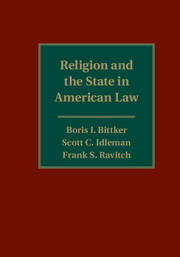Book contents
- Frontmatter
- Dedication
- Contents
- Preface
- 1 History and Introduction
- 2 Church and State in the Nineteenth Century
- 3 Religious Influences and Expressions in Law and Government
- 4 The Establishment Clause
- 5 The Free Exercise Clause
- 6 The Religious Test, Equal Protection, and Free Speech Clauses
- 7 The Definition of Religion
- 8 Church Property Disputes and Church Schisms
- 9 Contracts
- 10 Taxation
- 11 Employment
- 12 Land Use
- 13 Torts
- 14 Criminal Law and Process
- 15 Family Law
- 16 Public Education
- 17 Religious Symbolism on Government Property
- 18 Special Contexts: Prisons and the Military
- Appendix A Federal Constitutional Provisions
- Appendix B State Constitutional Provisions
- Appendix C Selected Federal Statutes 910
- Index
3 - Religious Influences and Expressions in Law and Government
Published online by Cambridge University Press: 05 October 2015
- Frontmatter
- Dedication
- Contents
- Preface
- 1 History and Introduction
- 2 Church and State in the Nineteenth Century
- 3 Religious Influences and Expressions in Law and Government
- 4 The Establishment Clause
- 5 The Free Exercise Clause
- 6 The Religious Test, Equal Protection, and Free Speech Clauses
- 7 The Definition of Religion
- 8 Church Property Disputes and Church Schisms
- 9 Contracts
- 10 Taxation
- 11 Employment
- 12 Land Use
- 13 Torts
- 14 Criminal Law and Process
- 15 Family Law
- 16 Public Education
- 17 Religious Symbolism on Government Property
- 18 Special Contexts: Prisons and the Military
- Appendix A Federal Constitutional Provisions
- Appendix B State Constitutional Provisions
- Appendix C Selected Federal Statutes 910
- Index
Summary
Introduction
Religion appears to be a pervasive, perhaps indelible dimension of human existence. Approximately 87 percent of the world's population has been characterized as religiously adherent, and in the United States, the percentage of self-identified religious individuals is roughly 89 percent, over 93 percent of whom are affiliated with specific religious traditions. Nearly two-thirds of Americans consider religion to be an important part of their daily lives. From a social science standpoint, it can be said that human beings appear consistently to contemplate questions and to form answers and belief systems regarding matters that have historically been deemed religious in nature. There is evidence as well that underlying or influencing this pattern of human activity are distinct biological factors. Even when traditional religion is removed from the picture, human beings nevertheless seem driven to embrace alternative frameworks of belief that exhibit characteristics of transcendence or that seek to answer the so-called ultimate questions of human existence. This might explain why totalitarian political regimes, in an effort to shape the moral and conceptual frameworks of their citizens, attempt not simply to suppress conventional religious belief systems but also to supplant those systems with ideological frameworks that purport to supply their citizens with statist worldviews.
In the United States, religion has been part of the nation's narrative since its beginnings. To be sure, “[t]he idea that God has directed the history of the United States has become a commonplace in American life, a way of imagining America's purpose and history that seems so thoroughly familiar that one can easily overlook its essential oddness.” When the rebellious American colonies prevailed over the British, given the dim prospect of victory at the Revolution's outset, the notion that Providence looked favorably on the new nation predictably served as an explanatory framework. When the country was divided during the Civil War, many in both the Confederacy and the Union – President Lincoln prominently among them – viewed the conflict as well as the outcome in religious, even apocalyptic terms. Imbued with religious significance, to be sure, have been many, if not most, of the nation's major events or developments: westward expansion across the continent, World War I,World War II, the cold war, and the civil rights movement of the 1950s and 1960s, to mention just a few prominent examples.
- Type
- Chapter
- Information
- Religion and the State in American Law , pp. 111 - 148Publisher: Cambridge University PressPrint publication year: 2015



